AFL warns it will send future incidents like David Mackay's to the tribunal
Despite concerns of David Mackay being a guinea pig for the league’s concussion crackdown, more players could face the same fate.
AFL News
Don't miss out on the headlines from AFL News. Followed categories will be added to My News.
The AFL has warned it would send an identical hit to David Mackay’s collision on Hunter Clark to the tribunal this weekend, despite the case being thrown out on Thursday night.
But the league will consider an end-of-year rule change to ensure it continues its crackdown on head high contact, even when players legally contest the ball.
AFL football operations manager Steve Hocking made no apologies on Friday for the process that saw Mackay on trial for his collision.
The AFLPA was so concerned with Mackay being cited it made an official written submission to the tribunal, believing he was used as a guinea pig for the league’s concussion crackdown.
Stream selected Fox Footy shows on Kayo Freebies completely free this June including AFL 360, On The Couch, Bounce & more. No Credit Card. No Brainer. Register Free Now >
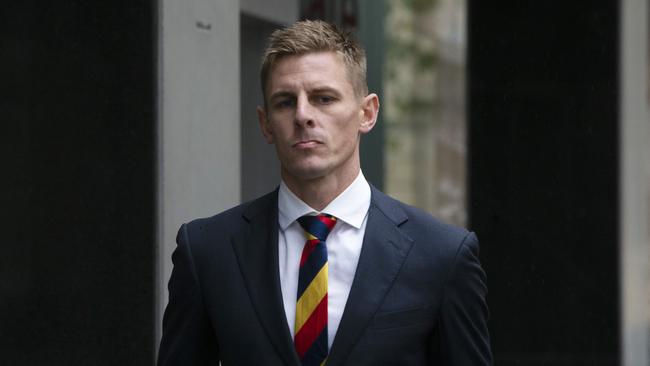
But Hocking said he had a high level of confidence players would change their approach to attacking the ball, even though the current rule has not changed.
Hocking said his advice to players through Round 14 was to apply a “level of care” to their opponent when they attacked the ball.
Mackay said on Friday despite an “exhausting” week that eventually saw him cleared by the tribunal on Thursday, he still believed in such a thing as football accidents.
“From my perspective it’s pretty clear what is acceptable and what isn’t,” he said.
“I am completely behind the AFL’s quest to make the game safer and protect the head and neck and it’s our responsibility to make the game as safe as possible, but there are times when accidents do happen, it’s the nature of the game and the way it’s played.”
Asked what he and MRO boss Michael Christian would do if a similar incident occurred this weekend, Hocking was adamant it might end up at the tribunal.
“We would just potentially rule the same way,” he said.
“What we see is in most instances players take a duty of care. They take a duty of care to themselves and their opponents.”
Hocking said the AFL still believed the Mackay attack on the ball was a bump but said the league did not need to make a mid-year rule change to change player behaviour.
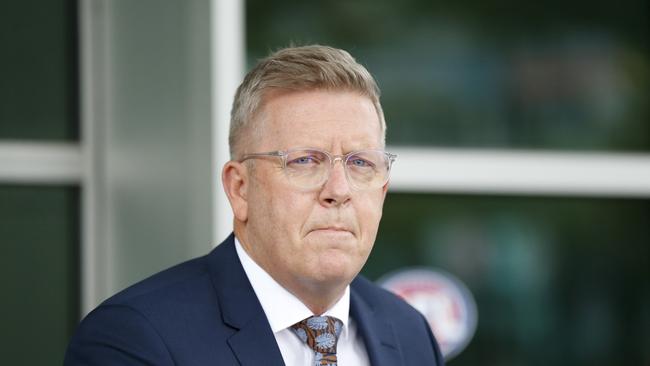
It means players will in effect need to change their behaviour even though the three-man tribunal upheld their right to attack the ball.
“The system worked. The rules have not changed. Players must take reasonable care at all times, including how they approach a contest. The outcome of the tribunal will be considered in that review, including whether rules will be adjusted at the end of the season.
“We will review the game at the end of the year, it’s about the evolution of the game and making it safer.”
The AFLPA board discussed Mackay’s case during the week and in its submission stated players could not be punished for contesting the ball when every indication from the league was that it was appropriate.
But Hocking said he would continue to make changes to the game to make it safer from the bottom down.
“While I am in this role I have a high level of care. I have to foreshadow the future of the game and I won’t personally be disrupted from that,” he said.
“Wherever we can protect the players’ heads and health and safety of the game, I will be at the forefront of leading the charge.
“We make no apologies for making the game safer for all participants at all levels of the game.”
Troubling report reveals AFL’s concussion rise
The AFL’s concussion incidence rate is on the rise again as the game’s No.1 injury concern continues to take centre stage.
The league released its annual injury report on Friday, detailing the key statistics and findings from last season in consultation with AFL club doctors and physiotherapists.
The unique circumstances in 2020 because of the Covid-19 pandemic, including a multi-month hiatus after Round 1 and reduced season with shorter breaks between games, meant scaled frequency data was used.
There were also no second-tier matches last year.
Concussion incidence – whether a match was missed or not – spiked from 6.54 per 1000 player hours in 2019 to 6.75 last season.

Hamstring strains remained the most common injury (4.86 new injuries per club) and cause for missed matches (15 AFL matches missed per club).
Calf strains and medical illness were the next-most regular ailments.
The AFL bowed to mounting pressure from experts to extend the mandatory time out this season for players who suffer a concussion from six to a minimum of 12 days.
Footballers must be clear of symptoms and complete three training sessions with the main group at their club, including one involving contact, before being eligible to play again after that period.
There are calls for the rule to increase to 30 days, a term AFL chief executive Gillon McLachlan said in April they would adopt if the science recommended it “but that’s not the advice at the moment”.
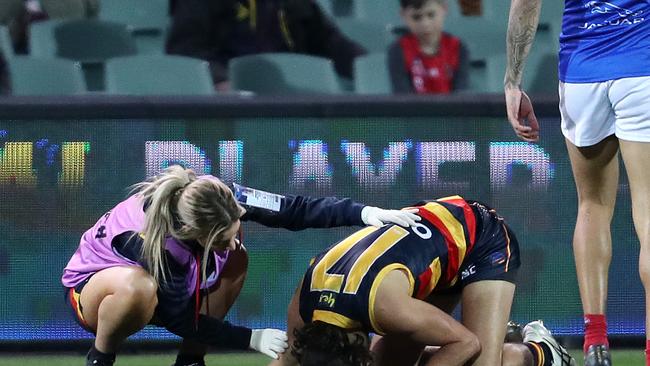
The AFL’s head of football operations, Steve Hocking, said player health and safety from the AFL to grassroots level was a top priority.
“Over recent years, we have continued to take action to strengthen match-day protocols and amend the laws of the game to discourage high contact,” Hocking said.
“Since 2019, we have used the technology that is embedded in the ARC to provide another opportunity to identify potential concussive incidents that would not have otherwise been detected.
“This year, we further strengthened the return-to-play aspects of the concussion management guidelines for the AFL and AFLW competitions.
“This reflects the ongoing conservative approach in managing concussions at the elite level, which then feeds into community football.”
Hocking has not ruled out further rule changes in the wake of Adelaide’s David Mackay avoiding suspension for a much-discussed bump that broke Saint Hunter Clark’s jaw.
The total number of new injuries per club last season was 33.1, down from 37.9 in 2019 and 39.1 in 2018, almost certainly owing to lower game time.
The AFL uses results from each year’s injury report to guide investment into injury research.
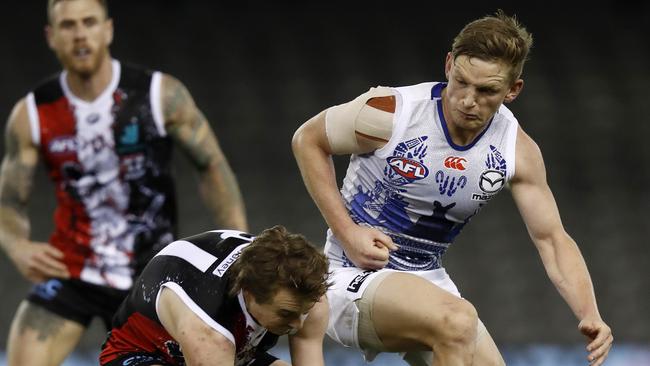
AFL boss: How the game can be physical and safe
AFL chief executive Gillon McLachlan has responded to fears about the sport’s direction, saying it was possible to protect the head and for the game to retain its physicality.
Debate about the decision to refer David Mackay’s bump on Hunter Clark – which left the young Saint with a broken jaw – straight to the AFL Tribunal raged all week.
Mackay escaping without penalty on Thursday night ensured the outrage was blunted, but concerns remain about how these types of incidents will be assessed in the future.
Speaking on the wider issue on SEN WA, McLachlan said the AFL was taking it “seriously”.
His interview was released on Friday, but the comments were made before the Mackay verdict was known.
“Protecting the head, concussion and the implications for our players is a very significant issue in our game,” McLachlan said.
“We were making rule changes in the early 2000s and we continue to make decisions around prevention, around diagnosis, around treatment and around research.
“We’ll continue to protect the head and that’s had pushback from lots of quarters … (but the) game will continue to make decisions to protect the head.”
Part of the lead-in commentary to Mackay’s hearing was that the sport’s ‘fabric’ would be damaged forever if the Crow was to receive a ban, which McLachlan refuted.
“It depends what you mean with fabric. I think it’s as physical as it’s ever been but it can be a physical game that still protects the head,” he said.
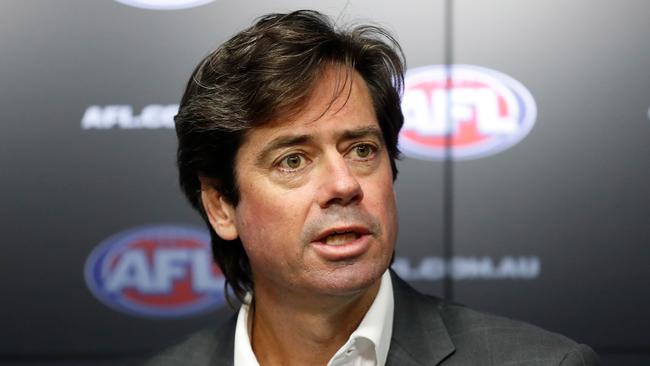
“If you sit on the boundary line, which I have the great fortune to do … they are so strong, so fast – when they hit each other, you have to be so tough and brave, in a way players have always been.
“I don’t think our game is any less tough … there is still such a role for toughness and bravery in our game, but we can do it in a way where we do everything we can to protect the head.
“That’s certainly our aim. If people think that’s changing the fabric, then I think it’s in a good way, because we need to protect the head.”
More Coverage
Originally published as AFL warns it will send future incidents like David Mackay's to the tribunal




